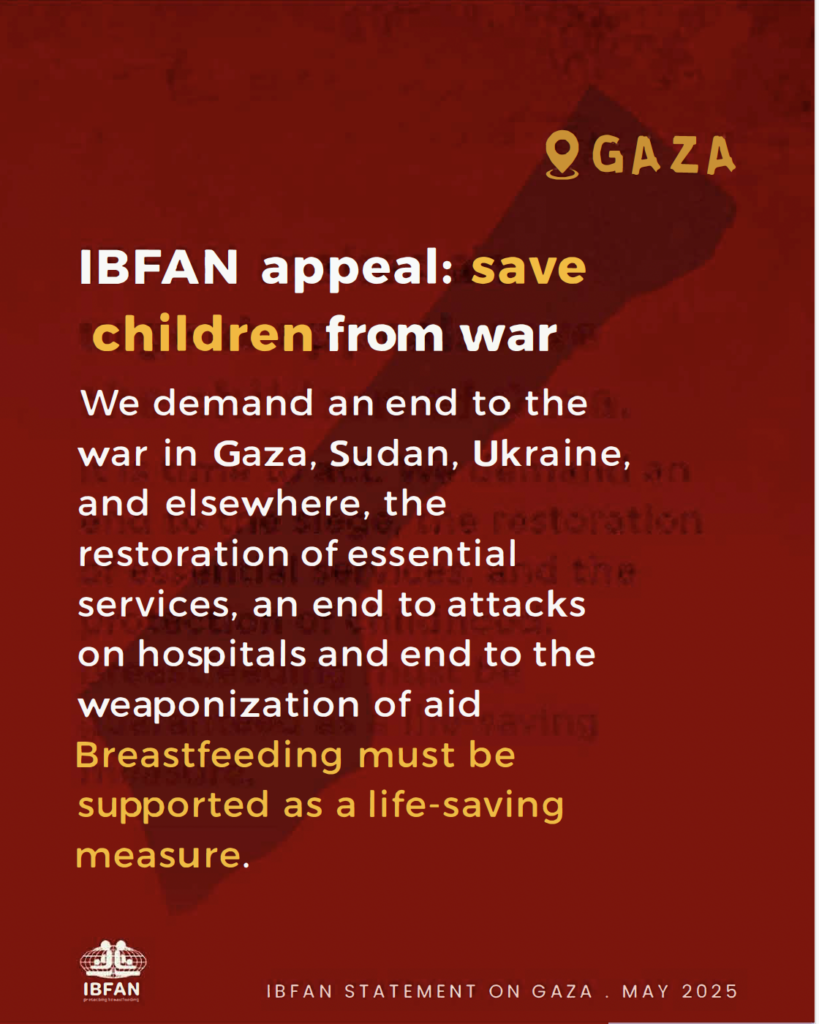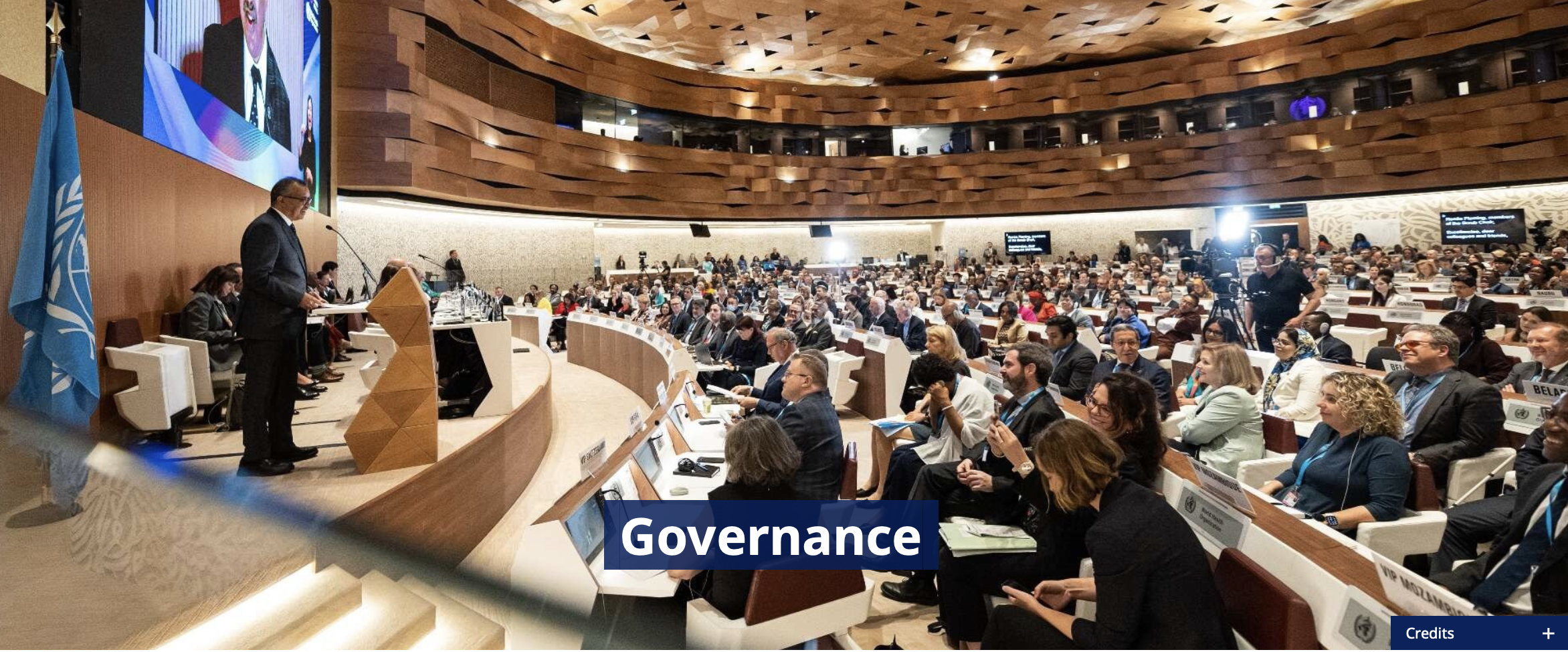WHA78: IBFAN calls for an end to attacks on hospitals, an end to weaponization of aid, regulation of Digital Marketing

WHO Webcast HERE. Background Documents. Daily Journal
Videos of IBFAN interventions HERE. the text is below
NSA Statements IBFAN WEBSITE
“In Gaza, Sudan, Ukraine and elsewhere, we continue to see attacks on health care, which are becoming a “new normal” of conflict. Last year we verified more than 1500 attacks on health care in 15 countries and territories, killing more than 900 people. In every country, the best medicine is peace, and a political solution. I hope peace will prevail that can transcend generations. War is not the solution. Peace is the solution.”
Dr. Tedros Gebreyesus opening address for the 78th WHA
IBFAN Statement on GAZA and all children
The videos of IBFAN interventions are HERE. the text is below
Item 17.3 Health conditions in the occupied Palestinian territory, including east Jerusalem
IBFAN is a founding member of the inter-agency Infant Feeding in Emergencies group, set up to ensure appropriate coordinated emergency responses. Humanitarian aid and food distribution must be safely labelled and not influenced by commercial agendas or exploited to create new markets for risky products. Infant mortality rises when inappropriate donations disrupt breastfeeding – a resilient practice that provides food, care and immune protection in all emergencies, preventing infection and malnutrition in all its forms. The DG said this week that attacks on hospitals and health workers have become the new ‘normal’. IBFAN calls for a resolution in this Assembly demanding immediate action from the UN General Assembly and the Security Council, to stop these attacks in accordance with the UN Charter and condemning the restriction of water, food and medical supplies to inflict collective punishment.
Items 12 and 13.1. prevention and control of noncommunicable diseases
An over-arching principle of the first UN Political Declaration and many WHO guides and Tools, has been the prevention and avoidance of commercial interference in public health policy development. However, despite the many references to ‘Multi Stakeholder engagement’ Conflicts of Interest safeguards are strangely missing from the report. With the pressure to prioritise economic growth over human and planetary health, Member States face a difficult challenge and must take care to ensure all interactions with private sector entities are transparent, follow independent evidence of risk and are grounded in human rights. If not, IBFAN fears that national NCD actions will be delayed and even derailed. WHO and Member States must also pay attention to Codex and ensure trade policies follow WHO recommendations, especially in relation to baby foods.
IBFAN appreciates WHO’s support for this work. Prenatal and postnatal exposure to toxic chemicals can harm children’s health. In some highly contaminated areas even breastfeeding may be at risk. However, in most cases the benefits of breastfeeding will be greater than harm caused by such contamination. Breastfeeding confers immunoprotective factors and helps build children’s lifelong immune system. Infant feeding products and packaging are inherently risky and contain plastics and Endocrine Disrupting Chemicals which impact on babies’ immune, reproductive and endocrine systems. WHO must continue work on the Global Plastics Treaty to develop a legally binding instrument on plastic pollution and protect the health of all children and their environment from toxic chemicals, while ensuring parents receive sound independent information free of commercial. influence. Thank you.
Investment in the protection and support of breastfeeding is an effective strategy to improve and protect maternal and infant mental health, and can decrease the risk of postnatal depression. Breastfeeding supports the emotional and cognitive development of the child and strengthens bonding through skin-to-skin contact, physical closeness and stress-regulating hormonal mechanisms from the first day of life. WHO has highlighted the fake science baby food companies use to mislead and create doubt in women’s ability to breastfeed, and together with inadequate support and maternity protection this can lead to anxiety and stress. Women have a sovereign right to choose how they feed their babies, but in order to do so they must be fully and correctly informed, supported and protected from misleading commercial messages
Agenda Item: 13.9 Global strategy for Women’s, Children’s and Adolescents’ Health
Mothers are being bombarded by online marketing that makes them doubt their ability to breastfeed. In just one click sound health authority advice is replaced by misleading commercial messages. This should be considered as a form of child exploitation that can have long-term consequences for child health and survival. Curbing digital marketing will not be difficult if a strong law, based on the International Code is in place, especially if the law includes the 20 resolutions that keep pace with marketing strategies. Governments can then allocate specific legal duties to the social media platforms and other actors who are responsible for controlling digital material, as is normal for tobacco, alcohol and other forms of exploitation. IBFAN urges everyone to support the Resolution, for urgent protection of children everywhere
Agenda Item 13.3 Universal health coverage.
IBFAN strongly. supports the right to access to free and adequate healthcare especially for women, girls and children. However, governments need to be careful when planning UHC to be transparent and base their plans on sound evidence with strong conflicts of interest safeguards to prevent health harming industries hijacking the process.
Prevention is critical and starts with early years: breastfeeding and the avoidance of ultra-processed products. Companies know exactly how to process ingredients to achieve sweetness and claim their products [marketed for pregnant and nursing mothers, formulas, baby foods in pouches] are the healthiest and environmentally friendly. Sweetness is addictive and sets up taste preferences for life. If on line health advice is part of UHC, it needs to be carefully monitored to protect against commercial influence, especially for mothers and children.
The following statement was not delivered:
Agenda Item 24.2 Review of and update on matters considered by the Executive Board were discussed during the 156th Executive Board meeting in February 2025. Comprehensive implementation plan on MIYCN 2012–2025) IBFAN supports the extension of global nutrition targets and the Decade of Action on Nutrition to 2030, aware that healthy nutrition is an essential priority for child health. We particularly welcome the extension of the target for exclusive breastfeeding at 6 months to 60%, and the addition of operational targets on early initiation of breastfeeding and access to counselling and clinical care. This will assist member states in adopting clear plans to achieve these targets. IBFAN is however, concerned that over-emphasis on ‘nutrients’ can result in inappropriate labelling and promotion of commercial foods for mothers and babies, and lead to parents believing that they are essential and better than nutritious, bio-diverse family foods. It is essential that Member States implement strong marketing laws to ensure that children receive optimal health and nutrition without commercial interference.
___________________________________________________________________________________
The 156th WHO Executive Board in February passed a Decision EB156 (30) to forward a draft Resolution, proposed by Brazil, Mexico, Norway, Armenia, Bangladesh, Brazil, Burkina Faso, Chile, Colombia, Dominican Republic, El Salvador, Guatemala, Iraq, Lesotho, Panama, Paraguay, Peru, Slovakia, Spain, Sri Lanka, Uruguay and Vanuatu, on the Regulation of Digital Marketing of Breast-milk Substitutes for consideration at the Assembly. The Decisions EB156(30) and EB 156 (37), are scheduled to be discussed on Friday 23rd May under the Global Strategy for Women’s, Children’s and Adolescents’ Health. (Agenda Item 13.9. Global strategy for Women’s, Children’s and Adolescents’ Health Documents A78/4 and EB156/2025/REC/1, decisions EB156(29) and EB156(30)
Another WHA resolution submitted by Ireland and Ethiopia will extend the Comprehensive Implementation Plan on Maternal, Infant and Young Child Nutrition an additional 5 years to 2030. The extension will increase the target for Exclusive Breastfeeding to 60% in 2030. It will also add operational targets on early initiation of breastfeeding, Infant and Young Child Feeding counselling, and consumption of sugary beverages WHO is also working with NGOs to develop electronic tools for monitoring of online Code violations for technical assistance for Member States in implementing the WHO Guidance.

Side Event. Wednesday 21st May, 12.00-15.00pm. Intercontinental Hotel
To join please fill in a registration form by clicking: HERE
Organised by IBFAN, Community of Practice Latin America and the Caribbean Nutrition and Health (Colansa), the Ministry of Health of Brazil, the Global Health Advocacy Incubator (GHAI), UNICEF, the Global Alliance for Healthy Food for Children and Adolescents (ALSANNA), Oswaldo Cruz Foundation (FIOCRUZ) and the World Obesity Federation (WOF)
Other side events in the UN Palais. UN Foundation listof side events WHO Explainer.
______________________________________________
Major reorganisation at WHO following USA withdrawal
World Health Organization Reorganization Plan Developed with Boston-based Consultancy


